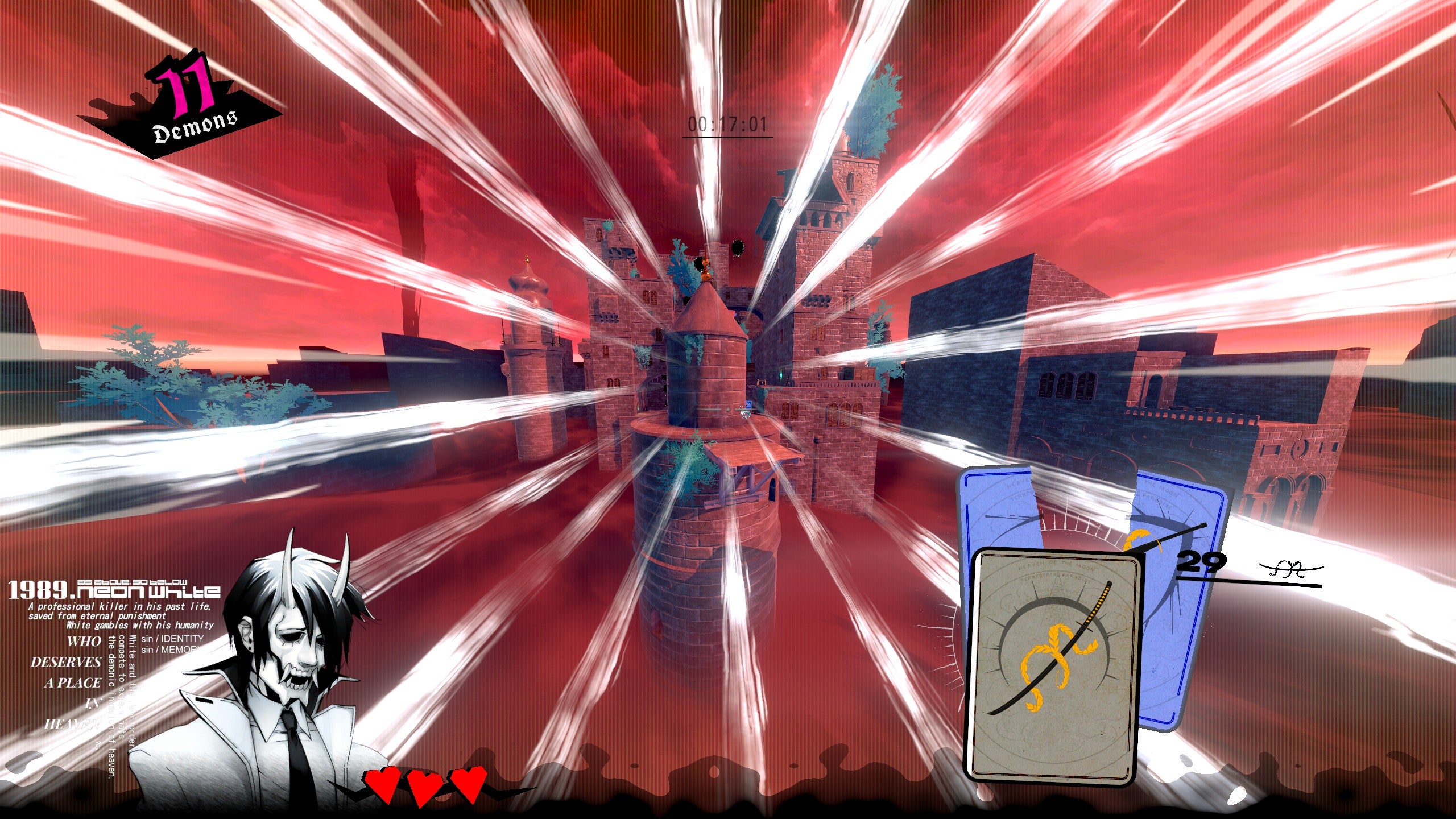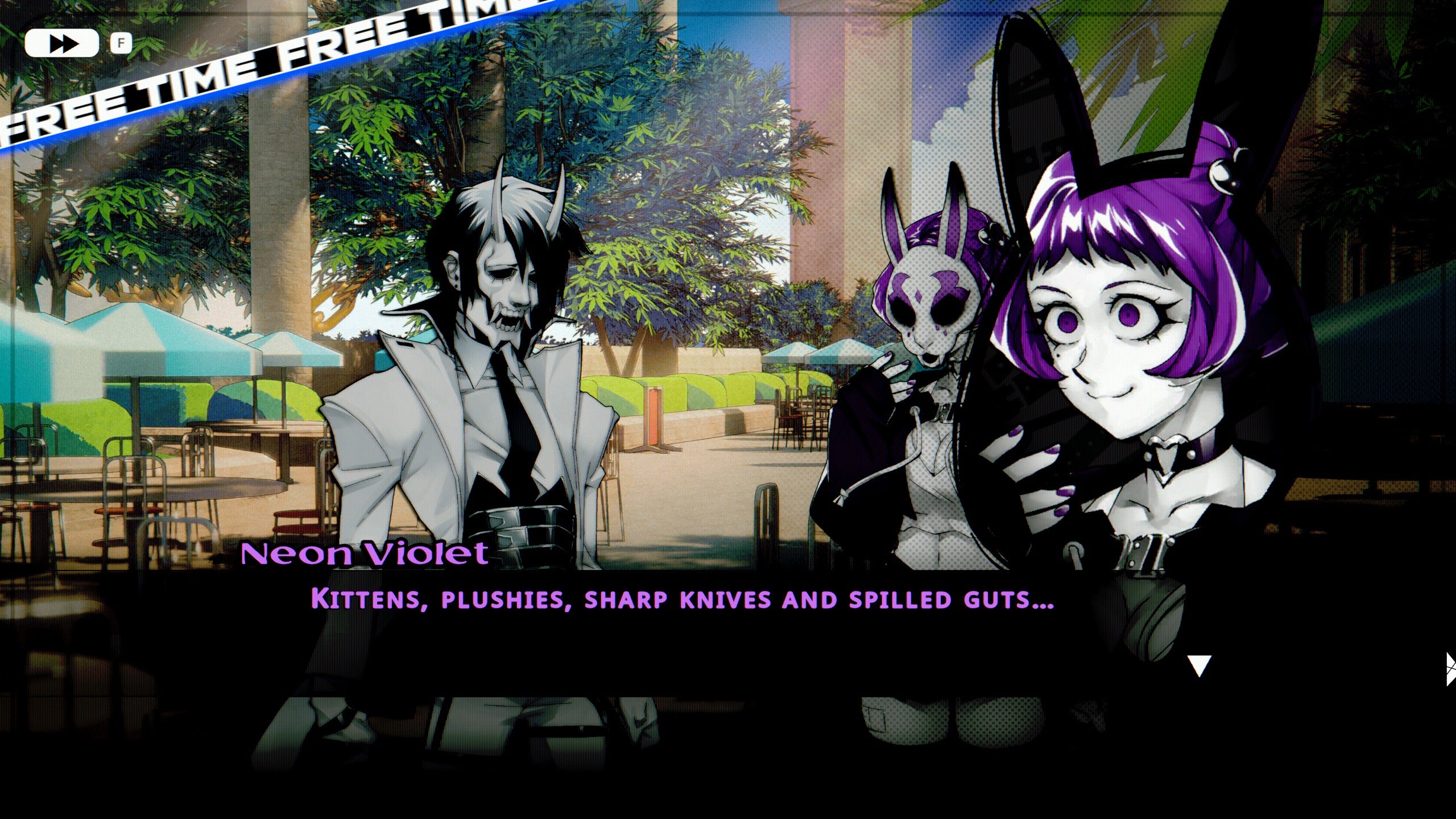The game opens with an extremely anime narrative sequence and we’re introduced to the lovable (and less so) doofuses we’ll be shooting up paradise with. This is where most folks will stop and squee at the fact that player character Neon White is voiced by the incomparable Steve Blum, perhaps known best for his role as sonorous space cowboy Spike Spiegel in Cowboy Bebop. White is joined by his fellow demon-slaying Neons including Yellow (best boy), Violet (sucks), Red (mysterious), and Green (bad guy). The general gameplay loop has you zipping through celestial arenas, gathering Soul Cards ( that act as guns) for offense and traversal, killing demons, and getting to the goal as fast as possible. Faster times net you a better rating, in turn increasing your rank and granting you access to more difficult missions. It’s a familiar setup to anyone who frequents this brand of speedrunning shooter, but the Soul Cards switch up the game by changing how you move through it. You can shoot demons with your pistol, or you can gobble up the pistol entirely and gain a midair jump. Your shotgun makes short work of enemies at point-blank range, but eating it turns you into a raging fireball of gravity-defying destruction. The challenge comes from balancing offense and traversal in a thrilling economy of speed. This emphasis on speed means that even small mistakes can cost you dearly. Undershooting a jump or mistiming a Soul Card ability can be the difference between getting a silver medal or a gold one. Thankfully, a quick tap of the F key restarts the level from the beginning if you mess up. I ended up tapping F quite a lot. In addition, replay ghosts and shortcut hints help to shave precious seconds off the clock. You’re incentivized to optimize your path through the level to the point of mastery, and it’s ever so satisfying when it all clicks. The only complaint I can levy against it is that the falling speed is a bit slow, but there’s a Soul Card ability specifically to remedy that problem. This wouldn’t work nearly as well if the levels weren’t an absolute joy to blitz through. Whether you’re chaining Soul Card abilities at a breakneck pace or racing against a string of explosions to reach a precariously rickety platform in time, each course pushes you to think fast and move faster. In a lesser game, this would be stressful and frustrating, but here the marriage of level design and player movement is so close to perfect that I can’t think of a single time where I found myself even remotely bothered by the prospect of having to repeat a stage. And the levels are meant to be repeated, both to achieve a faster time, and to find those crispy, shiny, dopamine-laden secrets. Clearing a level for the first time unlocks the ability to find a secret gift on a subsequent run. Nabbing these secrets requires a keen eye and clever planning, as they’re usually placed in out-of-the-way areas that require careful use of Soul Card abilities to reach. I always went back for these because they proved to be fun little puzzles in their own right. Gifts can be given to the various other Neons to receive rewards in the form of side quests and expository dialogue. This leads us back to the aforementioned loveable doofuses. While Neon White is first and foremost a slick speedrunning affair, the game also has social sim elements. White himself has amnesia, and as you build rapport with the other characters, the mystery surrounding who they were and what they did in their past lives begins to take shape. Giving gifts to characters raises their level of affection with you and unlocks cute little scenarios where they reveal more about themselves and their relationship with White. The characters are all hopelessly anime, but each managed to put a grin on my face at some point. My favorite part about the relationship system, however, are the side quests. Build up enough clout with a character and they’ll offer you a side quest. Side quests are unique courses themed after the character issuing them, with new special rules. Some side quests see your Soul Card abilities disabled, others have you escaping literal death traps. Completing these quests offers more insight into that character’s background and their role in the central mystery. The writing’s fun enough to make these little tidbits worth pursuing, and the excellent voice work gives the whole thing an earnestness that brings the characters to life. The only bad thing I can say about Neon White is that I wish there were more of it. I would have loved a level editor or workshop support where users could create and upload their own tracks. I suppose that’s a testament to the quality of what’s already there. Neon White is a solid, speedy romp polished to a mirror sheen and oozing with style. I think I’m gonna go try for a new best time again.

